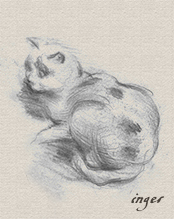My name is Inges, and I am as surprised as you are that I am still alive, though perhaps not as delighted.
If I am to believe what I heard of The Mazger all those years ago, I might – should I choose to continue the path of stealing souls – live as many as nine lives. I am now on my fifth, and it is certain that I shall see this one is my last.

You might wonder why I should make such a choice, with all that you know of the world and what a place it is with Inges in it, and what a place it might be without. But I would let you know: five is more than enough for anyone, even one such as I – perhaps especially one such as I. If I tot up all my lives together, you would say I have made an age that might see one such as yourself a little short of hair and long in the tooth, but still able enough to sit in the sun and peel turnips and tell tall tales of days gone by, even if the twinkle in a storyteller’s eyes has been dulled by the mists of time.
So you might expect me to wish more for myself, but I tell you this: for a cat, the years go by more slowly and old friends pass too quickly, and so I feel I have lived far longer than you might count in your simple world of calendars and notched candles. I am old in mind, if not in body, and I am bold enough to say “no more”.
That I have this life at all is in no short measure down to my great friend Kandahari Begum, and my dear brother in arms Atanka. That queen arranged it so I should take a new soul at my end, and that king of cats was noble enough to give me his. That soul I took? Well, Kandahari Begum was a queen, and so she could arrange things as she wished, and she arranged for a young English mercenary to stand guard that day, and to bring down the tiger who threatened her frail body, and to become the soul of Inges, and to carry me back to the familiar shores on which I now stand.
Now, some of you, I know will be able to count, and so you will say: “but Inges, I have read your tales and counted my fingers and I am sure that that young English soldier must have been your fourth soul, not your fifth”. And you would be right. For you see there is a story to be told of Inges and his fourth soul, and it is that story that I must tell you now – and you should know, it will be the most honest tale yet that you have heard of this bold cat.
I can be sure of that, because it is the first one I have written down myself. I am old, and so I have learned much. Long ago, in my first life, I learned to read the secret marks of humans that let them put their voices down on parchment and paper. And, in my long years with Kandahari Begum, I learned a way to make such marks myself. Not that I make them swiftly, or with any great flourish of calligraphy. Truth be told, my means of writing is not one I wish to discuss, as it is a little unconventional and certainly not at all hygienic. Needless to say, I have no ready supply of ink nor any quill with which to scratch my marks. We shall talk of it no more.
But in making my own words, I give you the truth, unvarnished and untainted by human interpretation or the putting on of fancy that some human writers have felt the need to spin into my previous tales. I will not paint the lily, not least because lilies are horrible flowers and most disagreeable to cats. Armed with my own quiver of words, I will hit the target clean now that I have no need of any human amanuenses. Or “a-man-mew-enses” as my old friend Vinegar Tom said when I told him. And I said to him that punning is the lowest form of wit, and he said: “no Inges, sarcasm is the lowest form of wit”, and I said: “really Tom? I did not know that, what a well-read and intelligent cat you are,” and he said: “why, thank you Inges,” and I say quod erat demonstrandum.
That is all by-the-by. I will not tell you of my fourth life here because to do so would be to take away from you the unmatched pleasure one can find in a good story told well. I put many hours, and much of myself, into crafting the tale I will tell you, and so you should let it unfold itself before you in the pages that follow.
And if it brings you to tears? If it stills your heart, or troubles your conscience, or fills you with that frail human humour of jealousy that such a life could not be lived by you? Then find me guilty of nothing more than being too honest in my words, too generous in my giving, and too humble in my willingness to show you the cat I am: flawed, fated and favoured in equal measure.
You will read a tale of adventure, of intrigue, of love and loss, honour and betrayal, derring-do and devilish deceit. Most of all you will read of a heroism drawn reluctantly by the heat of desperation and the force of necessity, as a fine blade of damask steel is forged from base rock by the beating of hammers and the roar of the furnace.
But then you would expect nothing less, for this is a tale of Inges.
